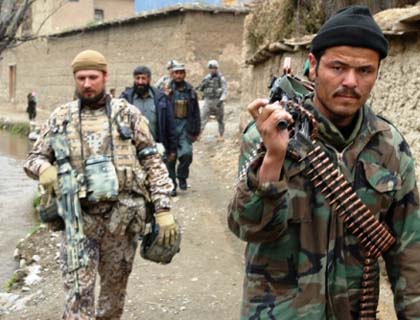KABUL - The Security Transition Board on Saturday reviewed the first trash of transfer and decided to brief President Hamid Karzai a day later on the second phase of process, officials said. Chaired by Dr. Ashraf Ghani Ahmadzai, head of the transition commission, the meeting was attended by ministers of interior and defense, the ISAF commander and the NATO civilian representative in Kabul.
On Wednesday, the Independent Directorate of Local Governance (IDLG) announced the 17 provinces where second phase of transition to Afghan forces would take place.
IDLG chief Abdul Khaliq Farahi told Pajhwok Afghan News they were ready to take over the security responsibility in Daikundi, Nimroz, Parwan, Samangan, Sar-i-Pul, Takhar, and Balkh provinces.
Security transfer will also take place in some districts of Badakhshan, Badghis, Ghazni, Helmand, Herat, Kabul, Ghor, Laghman, Maidan Wardak, and Nangarhar.
At Saturday's meeting, Ashraf Ghani said suggestions would be presented on Sunday to the president. The switch would be carried out in an appropriate and timely manner, he promised. Karzai is to unveil a final list of the areas at the Istanbul conference in Turkey on Nov. 2.
The nationwide security switch would progress step by step in line with the international community support and partnership, Ahmadzai added.
Gen. John Allen, ISAF commander in Afghanistan, billed the transition process as a success, and that Afghanistan would emerge as a key region player as a result of the security handover.
He described the transition exercise as a factor behind Afghanistan's stability, an example of what could be accomplished. "Partnership with Afghanistan can be accomplished when we work together, against the backdrop of improving security, capability of Afghan forces."
This transfer of security would also lead to better governance, economic opportunities, health, education and living standards for Afghans, the commander concluded.
NATO Civilian Representative Simon Gass, characterizing the process as a success, insisted they had achieved considerable progress in recent years. He was confident the country's security would successfully transition to Afghan forces.
"If we compare today's security to the situation two years back, we see a concrete improvement in many parts of the country. The transition process will continue until the end of 2014."
Gass added they would continue to train and equip Afghan security force, a critical component of the transition process. In a new phase of partnership beyond 2014, donors would continue to assist Afghanistan, he concluded.

